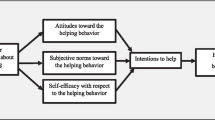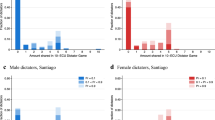Abstract
Carol Gilligan (1977, 1982) has proposed fundamental gender differences. Women typically conceptualize interpersonal dilemmas in terms of people and their relationships, whereas men often orient to dilemmas as practical problems. Although considerable research has explored these gender differences, they have usually been treated as psychological traits or abstract moral orientations. In this article we show how Gilligan’s theory accounts for gender differences when interviewees described their efforts to prevent others from driving under the influence (DUI intervention). This result extends Gilligan's theory by showing how it can account for real life differences between men and women. By demonstrating the relevance of Gilligan's gender differences to everyday life, we lay a foundation for further sociological exploration of her ideas.
Similar content being viewed by others
References
Auerbach, J., L. Blum, V. Smith, and C. Williams. (1985). “Commentary on Gilligan's In a Different Voice,” Feminist Studies 11:149–162.
Broughton, J.M. (1983). “Women's Rationality and Men's Virtues: A Critique of Gender Dualism in Gilligan's Theory of Moral Development,” Social Research 3:597–642.
Carter, R. and G. Kirkup. (1990). “Women in Professional Engineering: The Interaction of Gendered Structures and Values,” Feminist Review 35:92–101.
Cheney, J. (1987). “Eco-Feminism and Deep Ecology,” Environmental Ethics 9:115–145.
Collins, B. and J. Frey. (1992). “Drunk Driving and Informal Social Control: The Case of Peer Intervention,” Deviant Behavior: An Interdisciplinary Journal 13:73–87.
Dahlem, M. (1991). “Surrogate Motherhood and the Morality of Care,” Women and Criminal Justice 3:101–126.
Daly, K. (1989). “Criminal Justice Ideologies and Practices in Different Voices: Some Feminist Questions About Justice,” International Journal of the Sociology of Law 17:1–18.
Davis, K. (1992). “Toward a Feminist Rhetoric: The Gilligan Debate Revisited,” Women's Studies International Forum 15:219–231.
Davis, L.V. (1985). “Female and Male Voices in Social Work,” Social Work 30:106–113.
Donenberg, G.R. and L.W. Hoffman. (1988). “Gender Differences in Moral Development,” Sex Roles 18:701–717.
Eagly, A.H. (1987). Sex Differences in Social Behavior: A Social-Role Interpretation. Hillsdale, NJ: Erlbaum.
Fishman, P.M. (1983). “Interaction: The Work Women Do,” in B. Thorne, C. Kramarae, and N. Henley (eds.) Language, Gender, and Society. Rowley, MA: Newbury.
Flanagan, O.J. and J.E. Adler. (1983). “Impartiality and Particularity,” Social Research 50: 576–596.
Ford, M.R. and C.R. Lowery. (1986). “Gender Differences in Moral Reasoning: A Comparison of the Use of Justice and Care Orientations,” Journal of Personality and Social Psychology 50:777–783.
Friedman, W.J., A.B. Robinson, and B.L. Friedman. (1987). “Sex Differences in Moral Judgements? A Test of Gilligan's Theory.” Psychology of Women Quarterly 11:37–46.
Galotti, K.M. (1989). “Gender Differences in Self-Reported Moral Reasoning: A Review and New Evidence,” Journal of Youth and Adolescence 18:475–488.
Gilligan, C. (1977). “In A Different Voice: Women's Conceptions of Self and Morality,” Harvard Educational Review 47:481–517.
Gilligan, C. (1982). In a Different Voice: Psychological Theory and Women's Development. Cambridge, MA: Harvard University Press.
Gilligan, C. and J. Attanucci. (1988). “Two Moral Orientations,” in C. Gilligan, J.V. Ward, and J.M. Taylor, with B. Bardige (eds.) Mapping the Moral Domain: A Contribution of Women's Thinking to Psychological Theory and Education. Cambridge, MA: Harvard University Press.
Greeno, C.G. and E.E. Maccoby (1986). “On In a Different Voice: An Interdisciplinary Forum. How Different Is the ‘Different Voice’?” Signs 11:310–316.
Gusfield, J., J. Kotarba, and P. Rasmussen. (1981). “The Public Society of Intimates: Friends, Wives, Lovers and Others in the Drinking-Driving Drama,” Research in the Interweave of Social Roles: Friendship 2:237–257.
Hayles, N.K. (1986). “Anger in Different Voices: Carol Gilligan and The Mill on the Floss,” Signs 12:23–39.
Hernandez, A.C.R., M.D. Newcomb, J. Rabow, and N.H. Wolfinger. (1993). “Emotions and Helping Behavior,” paper presented at Annual Meeting, Western Psychological Association, Phoenix.
Hostelling, K. and L. Forrest. (1985). “Gilligan's Theory of Sex-Role Development: A Perspective for Counseling,” Journal of Counseling and Development 64:183–186.
Jansen, S.C. (1988). “The Ghost in the Machine: Artificial Intelligence and Gendered Thought Patterns,” Resources for Feminist Research 17:4–7.
Johnson, M.M. (1983). Review of Gilligan, Contemporary Sociology 12:448.
Johnston, D.K. (1985). Two Moral Orientations—Two Problem-Solving Strategies: Adolescents' Solutions to Dilemmas in Fables. Ed.D. diss., Harvard University, Cambridge.
Johnston, D.K. (1988). “Adolescents' Solutions to Dilemmas in Fables: Two Moral Orientations—Two Problem Solving Strategies,” in C. Gilligan, J.V. Ward, and J.M. Taylor, with B. Bardige (eds) Mapping The Moral Domain: A Contribution of Women's Thinking to Psychological Theory and Education. Cambridge, MA: Harvard University Press.
Katz, J. (1983). “A Theory of Qualitative Methodology: The Social System of Analytic Fieldwork,” In R.M. Emerson (ed) Contemporary Field Research. Illinois: Waveland Press.
Kerber, L.K. (1986). “On In a Different Voice: An Interdisciplinary Forum. Some Cautionary Words for Historians,” Signs 11:304–310.
Langdale, S. (1983). Moral Orientations and Moral Development: The Analysis of Care and Justice Reasoning Across Different Dilemmas in Females and Males from Childhood through Adulthood. Ed.D. diss., Harvard University, Cambridge.
Luria, Z. (1986). “On In a Different Voice: An Interdisciplinary Forum. A Methodological Critique,” Signs 11:316–321.
Lyons, N. (1982). Conceptions of Self and Morality and Modes of Moral Choice: Identifying Justice and Care in Judgements of Actual Moral Dilemmas. Ed.D. diss., Harvard University, Cambridge.
Lyons, N. (1983). “Two Perspectives: On Self, Relationships, and Morality,” Harvard Educational Review 53:125–146.
Mennuti, R.B. and D.G. Creamer. (1991). “Role of Orientation, Gender, and Dilemma Content in Moral Reasoning,” Journal of College Student Development 32:241–248.
Nails, D. (1983). “Social-Scientific Sexism: Gilligan's Mismeasure of Man,” Social Research 50:643–664.
Newcomb, M.D., J. Rabow, M. Monto, and A.C.R. Hernandez. (1992). “Informal Drunk Driving Intervention: Psychosocial Correlates Among Young Adult Women and Men,” Journal of Applied Social Psychology 24:1988–2006.
Nicholson, L.J. (1983). “Women, Morality, and History,” Social Research 50:514–536.
Ochs, E. (1992). “Indexing Gender”. In A. Duranti and C. Goodwin (Eds.), Rethinking Context. Cambridge, UK: Cambridge University Press.
Pratt, M.W., G. Golding, and W.J. Hunter. (1984). “Does Morality Have a Gender?” Merrill-Palmer Quarterly 30:321–340.
Pratt, M.W., G. Golding, W. Hunter, and R. Sampson. (1988). “Sex Differences in Adult Moral Orientations,” Journal of Personality 56:373–391.
Pratt, M. W., M. Pancer, B. Hunsberger, and J. Manchester. (1990). “Reasoning about the Self and Relationships in Maturity: An Integrative Complexity Analysis of Individual Differences.” Journal of Personality and Social Psychology 59:575–581.
Rabow, J. and M.D. Newcomb. (1992). “Informal Drunk Driving Intervention as Helping Behavior: Theory, Research, and Practice” Sociological Practice Review 3:94–101.
Rabow, J., M.D. Newcomb, M.A. Monto, and A.C.R. Hernandez. (1990). “Altruism in Drunk Driving Situations: Personal and Situational Factors in Intervention,” Social Psychology Quarterly 53:199–213.
Rhodes, M.L. (1985). “Gilligan's Theory of Moral Development as Applied to Social Work,” Social Work 30:101–105.
Rothbart, M.K., D. Hanley, and M. Albert. (1986). “Gender Differences in Moral Reasoning,” Sex Roles 15:645–653.
Sheldon, A. (1990). “Pickle Fights: Gendered Talk in Preschool Disputes” Discourse Processes 13:5–31.
Stack, C. B. (1986). “On In a different voice: An interdisciplinary forum. The culture of gender: Women and men of color,” Signs 11:321–324.
Stevens, L. (1989). “Different Voice/Different Voices: Anglican Women in Ministry,” Review of Religious Research 30:262–275.
Stiller, N.J. and L. Forrest. (1990). “An Extension of Gilligan and Lyons's Investigation of Morality: Gender Differences in College Students,” Journal of College Student Development 31:54–63.
Tannen, D. (1990). You Just Don't Understand: Women and Men in Conversation. New York: William Morrow.
Tannen, D. 1993. “The Relativity of Linguistic Strategies: Rethinking Power and Solidarity in Gender and Dominance.” In R. Tannen (ed.) Gender and Conversational Interaction. NY: Oxford University Press.
Thoma, S.J. (1986). “Estimating Gender Differences in the Comprehension and Preference of Moral Issues,” Developmental Review 6:165–180.
Tronto, J.C. (1987). “Beyond Gender Difference to a Theory of Care,” Signs 12:644–663.
Turrisi, R., J. Jaccard, S.Q. Kelly, and C.M. O'Malley. (1993). “Social Psychological Factors Involved in Adolescents' Efforts to Prevent Their Friends from Driving While Intoxicated,” Journal of Youth and Adolescence 22:147–169.
Walker, J.C. (1983). “In a Diffident Voice: Cryptoseparatist Analysis of Female Moral Development,” Social Research 50:665–695.
Walker, L.J. (1984). “Sex Differences in the Development of Moral Reasoning: A Critical Review,” Child Development 55:677–691.
Walker, L.J. (1989). “A Longitudinal Study of Moral Reasoning,” Child Development 60:157–166.
Walker, L.J., B. de Vries, and S.D. Trevethan. (1987). “Moral Stages and Moral Orientations in Real-Life and Hypothetical Dilemmas,” Child Development 58:842–858.
West, J.D. and D.E. Bursor. (1984). “Gilligan and Kohlberg: Gender Issues in Moral Development,” Journal of Humanistic Education and Development 22:134–142.
Wolfinger, N.H., J. Rabow, and M.D. Newcomb. (1994). “Reexamining Personal and Situational Factors in Drunk Driving Interventions,” Journal of Applied Social Psychology 24:1627–1639.
Yacker, N. and S.L. Weinberg. (1990). “Care and Justice Orientation: A Scale for Its Assessment,” Journal of Personality Assessment 55:18–27.
Author information
Authors and Affiliations
Corresponding author
Additional information
His interests include divorce, social demography, and research methods. His book on the intergenerational transmission of divorce will be published by Stanford University Press.
Jerome Rabow has been a professor of sociology at the University of California-Los Angeles since 1965. He has published more than 100 articles in the areas of drunk driving intervention, gender and money, education, and race relations. He recently completed Tutoring Matters: Everything You Always Wanted to Know About How to Tutor (Temple University Press, 1999), a book based on the tutoring experiences of his UCLA students. Professor Rabow is also a psychotherapist in private practice in Los Angeles.
He is also Research Psychologist and co-director of the Substance Abuse Research Center in the Psychology Department at the University of California, Los Angeles. Professor Newcomb has published over 200 papers and chapters and has written three books. His research interests include: etiology and the consequences of adolescent drug abuse; structural equation modeling, methodology, and multivariate analysis; human sexuality; health psychology; attitudes and affect related to nuclear war; and cohabitation, marriage, and divorce.
Rights and permissions
About this article
Cite this article
Wolfinger, N.H., Rabow, J. & Newcomb, M.D. The different voices of helping: Gender differences in recounting dilemmas . Gend. Issues 17, 70–86 (1999). https://doi.org/10.1007/s12147-999-0004-x
Issue Date:
DOI: https://doi.org/10.1007/s12147-999-0004-x




